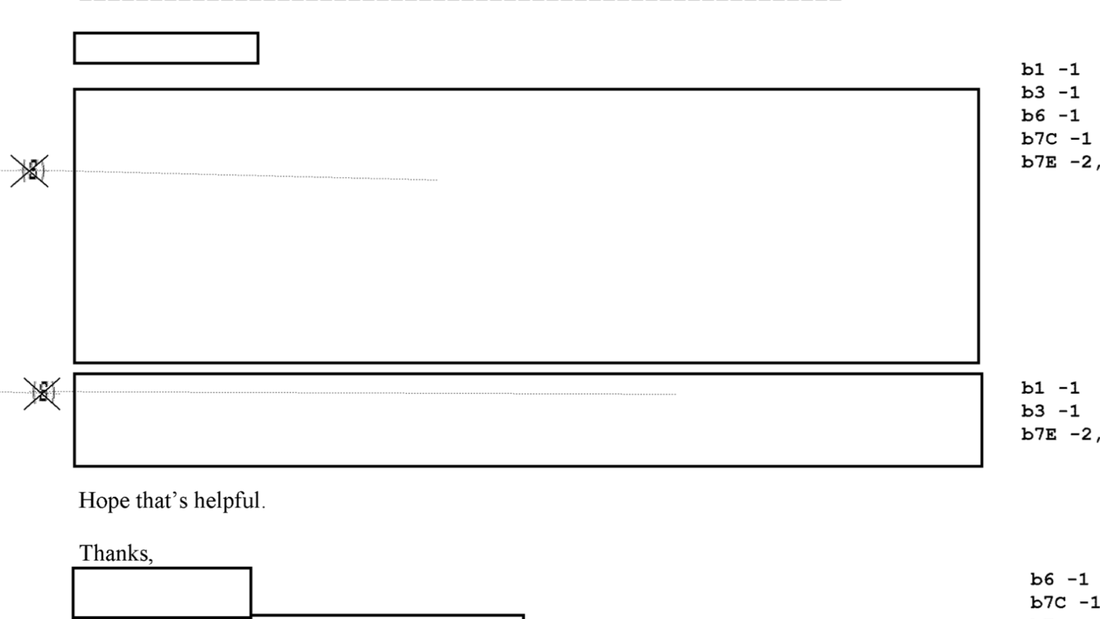|
For years PPSA has documented the increasing disposition of federal intelligence and law enforcement agencies to use the ever-expanding Glomar response – a “cannot confirm or deny” answer once reserved for the nation’s most closely guarded secrets – as a blanket response to any meddlesome Freedom of Information Act (FOIA) requests.
We should not overlook, however, another handy tool for FOIA avoidance, and that is to release the requested document but redact many or all of its meaningful parts. Now the Department of Justice Office of the General Counsel has perfected this technique, taking it to its logical end. It began in 2020 when PPSA joined with Demand Progress to file a FOIA request. Our request concerned surveillance that may be taking place under no statute, but instead under a self-professed authority of the executive branch known as Executive Order 12333. The reply from the FBI is, in its own way, telling. In the DOJ response, a certain Mr. or Ms. BLANK who holds the title of BLANK in the Office of the General Counsel returned with 40 pages of responsive documents. Thirty-nine pages are redacted in their entirety, as is the 40th page, with the redacted name of the signator and his/her redacted title, but with one, unredacted statement: Hope that’s helpful. There’s honestly no other way to take this than the Department of Justice shooting a middle finger at the very idea of a FOIA request, an exercise of the Freedom of Information Act, passed by Congress and signed into law by President Lyndon Johnson. This is a shame because the subject of this request is an important one. Demand Progress and PPSA based our FOIA request on a July 2020 letter from now-retired Sen. Patrick Leahy (D-VT) and current Sen. Mike Lee (R-UT) to then-Attorney General William Barr and then-Director of National Intelligence John Ratcliffe. The two senators noted the expiration of Section 215 of the Foreign Intelligence Surveillance Act (FISA), commonly known as the “business records” provision of FISA. The intelligence community had vociferously lobbied for the renewal of Section 215 with predictions that allowing its expiration would lead to something akin to the city-destroying scenes in the 1996 movie Independence Day. Then the Trump Administration called their bluff and allowed this authority to expire. The response from the intelligence community? Crickets. The sudden complacency of the intelligence community struck many as suspicious. Were federal intelligence and law enforcement agencies shifting their surveillance to another authority? Sens. Leahy and Lee seemed to think so. They wrote: “At times the executive branch has tenuously relied on Executive Order 12333, issued in 1981, to conduct surveillance operations wholly independent of any statutory authorization … This would constitute a system of surveillance with no congressional oversight potentially resulting in programmatic Fourth Amendment violations at tremendous scale … We strongly believe that such reliance on Executive Order 12333 would be plainly illegal.” This July 2020 letter, with a detailed series of penetrating questions about the practice and scope of 12333 surveillance, was issued by two powerful and respected members of the United States Senate … And it hit the walls of the Department of Justice and the Office of the Director of National Intelligence with all the full force of wet spaghetti. As with so many other congressional requests, this letter was not answered in any substantive way. So Demand Progress joined with PPSA in October 2020, in an effort to use the law to compel an answer, this time as a formal FOIA request. We leveraged that law to request responsive documents that would reveal how the agencies might be repurposing EO 12333 to pick up the slack from the expired 215 authority, in order to spy on persons inside the United States. And this is the answer we get. It can only be taken, in a general way, as confirmation that Executive Order 12333 is, in fact, being relied upon for the surveillance of people in the United States. This is one more reason why Congress should use the reauthorization of Section 702 to seek broad surveillance reform, including significant guardrails on Executive Order 12333. With mounting evidence of abuses of Americans’ civil rights, a powerful coalition of leading conservatives and liberals in Congress is building steam to do just that. Hope that’s helpful. Comments are closed.
|
Categories
All
|


 RSS Feed
RSS Feed